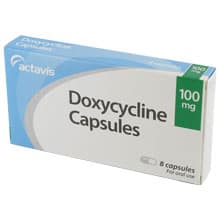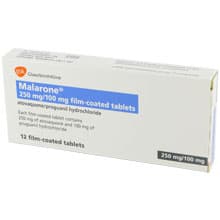Malaria: start your consultation
- 1. Answer the online medical questions
- This helps our doctors to decide which treatment is safe for you.
- 2. Select your treatment
- You will see a list of recommended treatments. You can select the one you prefer.
- 3. Checkout and delivery
- Once you’ve completed the checkout, our doctors will review your answers. If all is safe, you will receive your treatment tomorrow.
Available Treatment(s)

- Used to effectively prevent and treat malaria
- A suitable malaria prophylaxes treatment for sufferers of psoriasis and epilepsy
- Prevents malaria in areas where the parasite has become resistant to standard treatment

- Can provide effective protection against malaria
- Contains two different treatments making it better able to deal with the malaria parasite
- To be used in areas where the parasite is not yet chloroquine resistant
Malaria
Malaria symptoms, causes and treatment options online
Despite the readily available treatments, Malaria still remains a serious world health problem and annually around 1,500 cases are reported in the UK. The majority of these cases include people who have returned from a holiday abroad in a notorious risk area. If lest untreated malaria can lead to serious health conditions, such as breathing problems, liver disease, kidney disease and anaemia.
Luckily these conditions can be completely avoided and malaria can be successfully prevented and treated with the help of antimalarial prescription medication. Taking highly effective treatments like Doxycycline and Malarone can prevent a potentially serious and dangerous malaria infection. These malaria treatments can be ordered at OnlineClinic today.
What is malaria?
Malaria is a tropical disease that destroys red blood cells and eventually affects the liver and in very rare cases the brain. The parasite that causes it is passed amongst humans with the help of a non-human carrier, the female anopheles mosquito. There are five different types of parasites, namely Plasmodium falciparum, Plasmodium vivax, Plasmodium knowlesi, Plasmodium ovale and Plasmodium malariae, of which Plasmodium falciparum is the most likely to be dangerous or deadly.
Once the parasite is inside the body, it starts to infiltrate healthy blood cells, using the healthy cells to multiply and eventually causing them to burst. Each time a healthy cell bursts, the parasite spreads to even more healthy cells, until eventually the parasite reaches the liver where it can lay dormant, launching sporadic attacks on your system.
If this disease is left untreated for too long it can eventually lead to serious health problems such as anaemia, breathing problems, liver failure, low blood sugar, kidney failure, dehydration or a condition known as cerebral malaria, which is when infected red blood cells constrict blood flow to the brain.
In which parts of the world is it most common?
The anopheles mosquito lives in hot tropical climates, which is why it's most common in parts of South America, Central America, Middle East, Caribbean, Oceania, North Africa, Sub-Saharan Africa, and South and Central Asia. These are considered to be 'malaria hotspots'.
Malaria causes
The primary cause of malaria is a parasite called plasmodium. This is small single-cell organism (protozoan) that is spread to a person via a mosquito bite. The five most common types of plasmodium parasites that can infect humans are:
- Plasmodium falciparum – found in Sub-Saharan Africa with an infection time of nine to fourteen days.
- Plasmodium ovale – found in the Philippines, Indonesia and West Africa with an infection time of twelve to eighteen days.
- Plasmodium vivax – found in Africa, Asia and Latin America with an infection time of twelve to eighteen days.
- Plasmodium knowlesi – found in Southeast Asia with an infection time of eleven to twelve days.
- Plasmodium malariae – found worldwide with an infection time of eighteen to forty days.
Generally, the life cycle of the parasite (plasmodium) is the same for each of these.
Malaria symptoms
Symptoms can start appearing anything from 10 to 15 days after you've been infected, and for up to a year later, depending on the type of parasite. Being infected by the Plasmodium falciparum parasite usually leads to the onset of symptoms relatively quickly after you've been bittern. If you've just come back from holiday and you experience the following side effects it's advisable to speak to your doctor as soon as possible:
- High fever
- A cough
- Nausea
- Vomiting
- Headaches
- Muscle ache
- Sweats
- Chills
- Fatigue
- General feeling of malaise
Treating malaria
Malaria is treatable; however, it's better to prevent an infection than to undergo treatment, which can take time. Anti malarial drugs, also used in the treatment of this illness, can be used to prevent an infection. These treatments usually work by either preventing the parasite from defending itself against your body's immune system or multiplying. The most commonly used malaria treatments include: Doxycycline, Malarone and Paludrine & Avloclor. All of these treatments need to be started before you leave for your holiday, and continued until after you return. This is because it can sometimes take ten to fifteen days until symptoms begin to surface after the infection and in extremely rare cases symptoms can lie dormant for over a year. Malarone and Doxycycline are usually recommended for places where the malaria parasite has managed to develop a resistance. These treatments are taken orally in the form of antimalarial tablets.
Preventing malaria
Listed below are some methods that can be followed for the prevention of Malaria:
- Buying products containing eucalyptus oil
- Taking antimalarial prescription medication
- Using mosquito nets when sleeping
- Using mosquito repellent creams
- Using specific sun creams that prevent insect bites whilst travelling
Buying treatment
Malaria is a serious blood disease that can prove to be a big risk for people travelling abroad. Effective antimalarial medications can prevent the development of this infection during your travels. The treatments we provide include Doxycycline capsules, Malarone tablets and Paludrine & Avloclor tablets. These medications can protect you from malaria and prevent symptoms, such as high fever, nausea and fatigue. You can buy Doxycycline, Malarone and Paludrine & Avloclor at OnlineClinic after completing a quick, no obligation online consultation. For more information about these malaria treatments please refer to their respective product pages.
medical form
medication
prescription
from pharmacy
